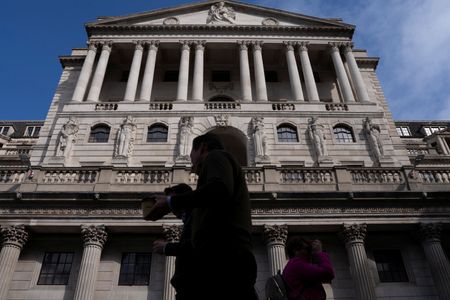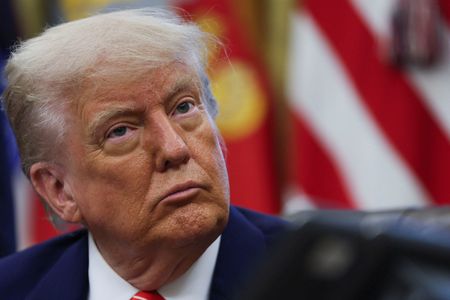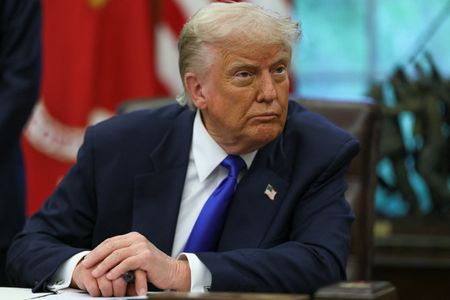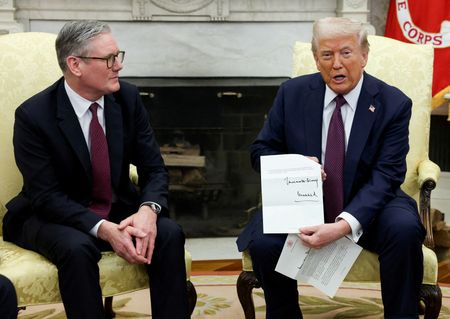By David Milliken, Suban Abdulla and William Schomberg
LONDON (Reuters) – The Bank of England cut interest rates on Thursday, although the uncertain impact of U.S. President Donald Trump’s tariffs on economic growth brought a surprise three-way split among policymakers.
The BoE’s rate-setters voted 5-4 in favour of cutting borrowing costs by quarter of a percentage point to 4.25%.
Two members of the Monetary Policy Committee, Swati Dhingra and Alan Taylor, voted for a bigger half-point cut, while Chief Economist Huw Pill and external member Catherine Mann wanted to keep rates on hold.
Thursday’s decision was the British central bank’s first since Trump announced wide-ranging tariffs on April 2, which triggered temporary market turmoil and prompted the International Monetary Fund to cut its growth forecasts for most major economies, including Britain.
The BoE said it thought tariff increases by the U.S. and other countries would weigh somewhat on British economic growth and push down on inflation, but stressed the outlook is unclear.
“The past few weeks have shown how unpredictable the global economy can be. That’s why we need to stick to a gradual and careful approach to further rate cuts,” BoE Governor Andrew Bailey said, repeating the BoE’s previous guidance.
Short-dated British government bond yields, which are sensitive to speculation about interest rate changes, jumped after the announcement. Sterling rose by around a third of a cent against the U.S. dollar.
“The two votes from committee members to hold rates steady sent a more hawkish message to the market. Beneath the hood, we still think that the conditions for cuts remain in place,” said Matthew Landon, global market strategist at J.P. Morgan Private Bank.
Since mid-2024, the BoE has cut interest rates by the same amount as the U.S. Federal Reserve but less than the European Central Bank, due to concerns about high wage growth as well as the risk of persistently above-target inflation.
The BoE said it had no pre-set path for rates. Elsewhere in its policy meeting minutes it said the impact of global trade tensions “should not be overstated”.
“Interest rates are not on autopilot. They cannot be,” Bailey told a news conference. “Instead, the MPC must continue to respond carefully to the evolving economic circumstances and the outlook for inflation in the UK.”
For three of the policymakers who voted for a quarter-point reduction, the decision to cut would have been “finely balanced” if the tariffs had not come into effect, the minutes showed.
Based on the situation as of April 29, the BoE estimates the U.S. tariffs will reduce the size of Britain’s economy by 0.3% in three years’ time and help return inflation to target sooner.
Later on Thursday, the United States and Britain are expected to announce a deal to lower some of Trump’s tariffs on British exports.
“I very much welcome it, and I think it’s ‘very well done’ to those involved, and the reason for saying that is that it will help to reduce uncertainty,” Bailey said.
However, the BoE said around two thirds of the damage it forecast to British growth was due to the broader effects of tariffs on the world economy rather than direct tariffs on Britain.
INFLATION FORECAST CUT
On Wednesday, Fed Chair Jerome Powell highlighted ongoing uncertainty about the impact of trade policy on the economy as the U.S. central bank held off from a further rate cut.
While investors still expect the BoE to cut interest rates close to 3.5% by year-end, June now looks much less likely to yield an interest rate cut – with the probability falling to 40% from around 75% before Thursday’s announcement.
In a quarterly forecast update on Thursday, the BoE trimmed its expectation for inflation this year, seeing it peaking at around 3.5%, lower than a previous forecast of around 3.75% and up from the latest official reading of 2.6% in March.
It sees inflation back at its 2% target in the first quarter of 2027 – nine months earlier than it forecast in February.
The central bank expects the economy to grow this year by 1%, a bit more than February’s forecast of 0.75%, thanks to a strong end to 2024 and robust official data at the start of 2025. It said that first-quarter growth bounce looked erratic, however, and estimated the underlying quarterly growth rate at just 0.1%.
The BoE also set out new alternate economic scenarios, moving away from a previous set which focused on the persistence of domestic inflation and a tight labour market.
(Writing by David Milliken and William Schomberg; Editing by Catherine Evans)









